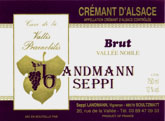|

|
|
|
|
|
|
Home |
|
|
|
|

|

|
|
|
|
|
|
|
|
|
|
|
Press
reviews |
|
|
Rather
than speak about the qualities of our wine, here are some press reviews by
well established wine journalists known for their wine knowledge and their
objectivity.
|
|
|
|
|
Journal
L'Alsace (june
2003)
Each week, on the "It's Sunday" page, this daily paper of the Haut-Rhin
publishes an article about a wine which has caught the attention of the
writer. On 29 June 2003, this analysis, which is not reserved exclusively
for the wines of Alsace, featured a Sylvaner from our estate:
|
2001
Vallée Noble Sylvaner
The
Brotherhood of Saint Etienne has just published its 2003 honours
list of "seal-holders of Alsatian wines". The learned assembly,
renowned for its bacchanalian pomp and its proselytism of the wines
of Alsace, is also the organiser of a contest. The standard is high,
and the award, the "seal", is not easily won. The bottles are
devoutly stored in the wine cellars of Kientzheim Château. The
honours list serves also as a reference guide. Five Sylvaners
feature in the 2003 edition. Proof that this little-loved Alsation
varietal does have its supporters.
|
|
Among
these is Seppi Landmann, known for his baroque wines, but also for
his Sylvaners "Cuvée Z" and "Hors-la-Loi". The Soultzmatt wine-maker
explains that this seal-winning 2001 Vallée Noble came from a
vineyard close to Pfingstberg, and from a reasonable yield. The
colour is a clear yellow, the nose delicately combines exotic
fruits, the scent of flowers, and the flavour, common to the
varietal, of milky brioche. The palate is supple: an initial mist
of fruits of the South and fruit drops, with mineral and bitter
almond flavours in the finish. A fine summer wine which will also
complement traditional cooking in any season. |
|
|
Vignobles
& Co
(march 2003)
A section titled "Alsace, best of the rieslings" devotes a whole page to
the estate. Here are some extracts:
|
Issue
9 (March to May) page 57 :
Seppi Landmann, cantor of Zinnkoepflé
It is
not easy to sketch a portrait of so emblematic a figure. Seppi's
debonair silhouette and florid beard roam all over this region,
where he is known as the white wolf! His wines are his passport, and
their quality is his entry permit. But it is others who do the real
travelling: his visitors come from all corners of the earth to taste
the precious nectars which he concocts, and which you have to earn
the right to taste. We were judged deserving, and were thoroughly
spoiled: he brought out 28 wines for us, including a 1998 ice wine,
barrel-matured in the Jura style, in a sumptuous vertical tasting
going back to 1982, the year of his arrival at the estate! (...) |
|
Having
arrived in his Vallée Noble 20 years ago, he has not stoppped
improving on that which he found here. He was part of the rebirth of
Zinnkoepflé Grand Cru, and thanks to him, the wines can proudly show
their character and uniqueness. It is he, too, who, twelve years
ago, was the first to bring ice wines back into favour. (...)
What
we liked :
2000
Vallée Noble Vendanges Tardives (Late Harvest):
rich
but fine, delicate, generous and sensitive, like its maker!
2000
Zinnkoepflé Riesling Grand Cru:
mineral, dry, with a vivacious palate. A wine which strikes a
balance between finesse and richness. Very seductive. |
|
|
|
Cuisine
& Vins de France (September
2002)
|
Issue
of September-October 2002 :
1996 Tokay Pinot Gris Great Classified Zinnkoepflé (19 €) :
Zinnkoepflé means "head in the sun" and, indeed, it has a golden
hue, and the palate offers hints of pear and a trace of residual
sugar. The combination is exotic (it is suggested that one serve the
wine with glazed veal breast and carrots). This Tokay would also be
superb with creamed chestnuts or a creamy goat cheese.
Marlène
Vendramelli (Wine waiter at the Hotel Bristol in Paris) |
|
Special Issue (November 2002) :
2000
Riesling Vallée Noble (6,40€) :
The
2000 Vallée Noble Riesling reveals minerals in the nose,
complemented by subtle hints of smoke and citrus. This elegance
carries through to the palate, the wine being supple and rounded at
first, with a lovely oiliness enveloping a beautifully aligned
structure. It is not exuberant, but is very clean, with a lingering
persistence in the finish. Serve with almond trout. |
|
|
|
Gault
et Millau Magazine, September 2002
In
this issue there is a long article devoted to sylvaner. The authors say
that a blind tasting enabled them to classify the Alsace wineries. Seppi
Landmann is at the top of the category " Exceptional
sylvaners " for his Reserve Outlaw Wine (Cuvée Hors la loi
2000) as well as in the category "Sylvaner wine from an exceptional
georegion" (Sylvaner vin de terroir) with his Reserve Z 2000.
At
the end of the magazine there are the recommendations to build up your own
cellar and here again Seppi Landmann’s name is recommended for the
basics in the category (wines for cellaring).
|
Sylvaner Cuvée Hors la Loi 2000
Acacia honey characterizes the nose of this wine and despite its
extraordinary density succeeds in bringing together delicacy and
power. This Reserve supported by good acidity, is close to a late
harvest wine; it has kept its elegance and developed a fresh
aftertaste.
|
Sylvaner, old vines, Reserve Z 2000
Z for Zinnkoepflé, a great classified growth area, is in both the counties
of Soultzmatt and Westhalten, which due to their exposure and their altitude
concentrate and amplify the grape variety. The colour of the wine is deep
yellow, its nose is honey, the palate is powerful, but still with aroma of
honey, and maintains a complexity over its full tasting length. A wine that
will improve with age.
|
Le Domaine Seppi Landmann’s winery
To see and hear him, you could never imagine what a demanding wine
maker he is in his own wine making cellar. When perfection is not
reached he simply downgrades the bin, without even a second thought.
The best expression from this wine artisan is to be found in his
Zinnkoepflé gewurztraminer or late harvest riesling which are both
models of precision.
|
|
|
Guide des Vins des Sommeliers
2000 (presentation at the Hotel Ritz, 16 September 1999)
|
|
Zinnkoepflé
noble rot great classified Gewürztraminer,
1989
An
intense golden yellow. Marked by its georegion, rose petal nose,
licorice, saffron and cinnamon
overtones. Full bodied, stylish with good smooth acidity.
This
is perfection. A bottle that is rare and almost impossible to find!
Start opening it in 2002, open an hour before
serving. Serve in a decanter at 12° C. Maturity in 2006.
Grade: 19/20
|
Zinnkoepflé
great classified Riesling, ice wine, 1990
A
superb golden yellow. A nose of quince and yellow cherry plum heightened by
a touch of peach and mineral aromas. Powerful attack and fresh and lively on
the palate with fine fruit. An everlasting aftertaste. A rare nectar that
can hold its own with a great sauterne. A magnificent bottle.
Maturity
in 2005, open an hour before serving. Serve in a decanter at 13° C with a
grilled veal cutlet and chanterelle mushrooms or alone just for its own sake.
Grade:
14/20
|
|
Zinnkoepflé
great classified Riesling, 1992
Color: Greenish tints on a yellow background. Complex nose of flowers,
grapefruit slowly evolving towards more mineral overtones. The palate
follows the harmonious and well balanced nose.
A
great classified growth that is typical of its variety and georegion
and has good potential. Seppi Landmann is a leader in the Noble
Valley, his wines are remarkable. Ready for drinking in 2001.
Maturity in 2004. Serving temperature: 13° C.
Grade: 17/20 |
Zinnkoepflé
great classified Riesling, 1996
Fine
brilliant yellow with sunny tints, bewitching and open nose with
elegant quince and grapefruit aromas. An ethereal palate with average
sweetness. Mineral freshness. Average aftertaste.
There
is more nose than palate, but the overall effect is delicate. A
delicious and superbly balanced wine.
This
passionate and generous winemaker offers futures buying.
Drink
before 2030, open 1/2 an hour before serving. Serve in a decanter at
8° C with a quince pie. Grade: 17/20.
|
|
|
La Revue du Vin de France
N°439 March 2000: Alsace great classified growths
|
|
Zinnkoepflé
great classified late harvest Gewürztraminer, 1989 ****(*)
The
nose brings together roses and aniseed with a touch of garlic due to its
age. The attack on the palate is concentrated with perfectly integrated
sugar (only 30g). The aftertaste is long and fresh. This lovely example of
late harvest is well balanced and appeals by the elegance of its
crystallized fruit as well as the firmness of its flavor. It can be drunk
for years to corne either atone for itself or with lobster and a touch of
vanilla.
|
Zinnkoepflé
noble rot Tokay-Pinot
gris, 1996 ****
An
expressive nose mixed with grapes, crystallized fruit, honey and
smokiness. The complex palate seems to be well structured and long
with pure well integrated noble rot. This beautiful, dense, well
structured and powerful wine will provide superb drinking for the
next ten years to corne for those who have the good idea to put it
in their cellar.
|
Zinnkoepflé
noble rot Riesling, 1997 ****
A
nose that is fresh and pure where aniseed is mixed with crystallized fruit
from good noble rot.
The
attack seems quite dense, the follow up well balanced with tropical fruit
that lasts. The clean Riesling taste is matched
with the power of noble rot. Moderate cellaring, to be drunk in the next
five years.
|
|
|
|
|
|
|
|
|
|
|

|
|
Le Nouvel Economiste
(N°1127,
May 1999)
Less
well known and often an excellent quality/price ratio, the sparkling
Alsace wine has made its remarkable entry on the market of sparkling
wines. Worthy of his Alsace origin, the Rabelaisian Seppi Landmann
produces the best Alsace sparkling wine thanks to long aging in
horizontal stacks after bottling. The sumptuous 1987 is only
marketed in magnums which is just fine for a dinner for two!
|
|
La
Revue du Vin de France
The
white wine treasures of Alsace (12/1999)
Seppi
Landmann: Noble Valley dry sparkling wine.
Its
nose is an array of exotic aromas. The palate is constructed on
solid extract and pleasant fruitiness. In short, this sparkling wine
does not lack personality.
|
|
|
|
|
|


